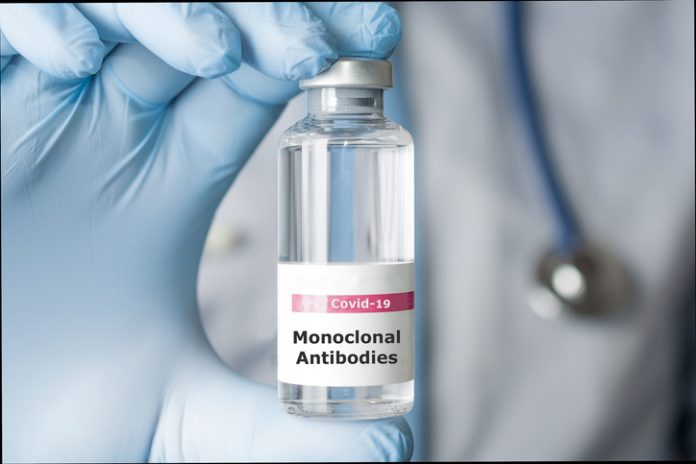The U.S. Food and Drug Administration abruptly limited the emergency use authorization (EUA) for the Regeneron monoclonal antibody treatment for COVID-19, in a second reversal of policy on the use of the biologic treatment, on January 24.
The FDA’s action came after Florida Gov. Ron DeSantis tried to secure more doses of the treatment for his state. The Biden administration took over distribution after Florida opened monoclonal antibody treatment centers throughout the state. DeSantis tried to secure 30,000 doses a week from the Biden administration. On January 7, DeSantis announced Florida would get only half the requested amount.
“But for the federal government’s decision to restrict the supply of monoclonal antibody treatments to Florida, my administration would have already opened additional monoclonal antibody treatment sites throughout the state,” said DeSantis in a January 7 statement. “Before the Biden administration seized control of the monoclonal supply after Florida pioneered its widespread use and demonstrated its efficacy, approximately 30,000 doses per week were being administered to Floridians, saving countless lives.”
There are four antibody treatments for COVID-19. The FDA no longer authorizes emergency use for three of them: the one made by Regeneron known as casirivimab or imdevimab, and the two made by Eli Lilly, bamlanivimab and etesevimab, which are administered together. Sotrovimab, made by GlaxoSmithKline, is a laboratory-made monoclonal antibody treatment and is still available for treatment.
Treatment Centers Closed
At the request of DeSantis and other officials, in early January the U.S. Department of Health and Human Services (HHS) reversed its earlier policy and began preparations to send 30,000 more doses of Regeneron to Florida.
The FDA then switched course again and pulled its EUA for Regeneron and a monoclonal antibody from Eli Lilly without advance notice, putting Florida’s plans to use the treatments for COVID-19 patients on hold indefinitely.
“Unfortunately, as a result of this abrupt decision by the federal government, all monoclonal antibody state sites will be closed until further notice,” the Florida Department of Health stated on January 24. “Florida disagrees with this decision that blocks access to any available treatments in the absence of clinical evidence. To date, such clinical evidence has not been provided by the United States Food and Drug Administration.”
“I just think they don’t have enough treatments to go around, and I think they realize that,” said DeSantis at a January 25 press conference. “And I think it would look very bad to be able to admit that, so instead they’re saying this is revoked.”
Takeover Spreading
The government’s handling of Regeneron is typical of what can happen when the health bureaucracy gets between the doctor and the patient, says Marilyn M. Singleton, M.D., J.D., former president of the Association of American Physicians and Surgeons.
“Unfortunately, the government’s takeover of Regeneron’s product (Regen-COVC) set the precedent for the government to do likewise with GlaxoSmithKline’s monoclonal antibody preparation, Sotrovimab,” said Singleton. “Unlike the EUA for the mRNA vaccines, U.S. government control over the distribution of Sotrovimab is a condition of the authorization.”
This can cause a big problem because of the rise of Omicron, says Singleton.
“Sotrovimab appears to be the only monoclonal antibody preparation that is effective against the more dominant Omicron variant,” said Singleton. “According to CDC estimates, Omicron makes up 99 percent of new COVID-19 cases.
“Having the federal government take charge of supplies of medications is a larger issue than COVID-19,” said Singleton. “This further widens the already-opened door to the federal government dictating medical care through treatment pre-authorizations, government drug formularies, and the like. Recall that when Medicare was passed in 1965, the law [42 U.S. Code § 1395] specifically prohibited the federal government from ‘exercis[ing] any supervision or control over the practice of medicine or the manner in which medical services are provided.’”
Doctors Overruled
Governments should not outlaw potentially useful treatments, says Florida Surgeon General Joseph Ladapo, M.D.
“In our field of medicine, when someone comes to you seeking a treatment that could save their life, it is essential to have treatment options to ensure health care providers can make the best decisions for their patients,” said Lapado in a January 24 press release.
Doctors have to stand up for their rights, says Singleton.
“Physicians must tell the federal government to keep its promise,” said Singleton. “Make the drugs available for direct purchase by the states.
“Let physicians make medical decisions,” said Singleton. “Using their clinical judgment, physicians will allocate medical treatment based on medical criteria affecting the likelihood of severe COVID-19 outcomes—age 65 or older, recently diagnosed hematologic malignancy, cancer chemotherapy, solid organ transplant on immune suppression, obesity with BMI >30-40 kg/m2, cardiovascular disease, pregnancy, poorly controlled diabetes, significantly reduced kidney function, COPD [Chronic Obstructive Pulmonary Disorder], stroke, and two or more risk factors.”
Bonner R. Cohen, Ph.D. (bcohen@nationalcenter.org) is a senior fellow at the National Center for Public Policy Research.
This article was updated on February 9, 2022.






















[…] post Biden Administration Reverses Decision on COVID-19 Treatment (Again) appeared first on Heartland Daily […]